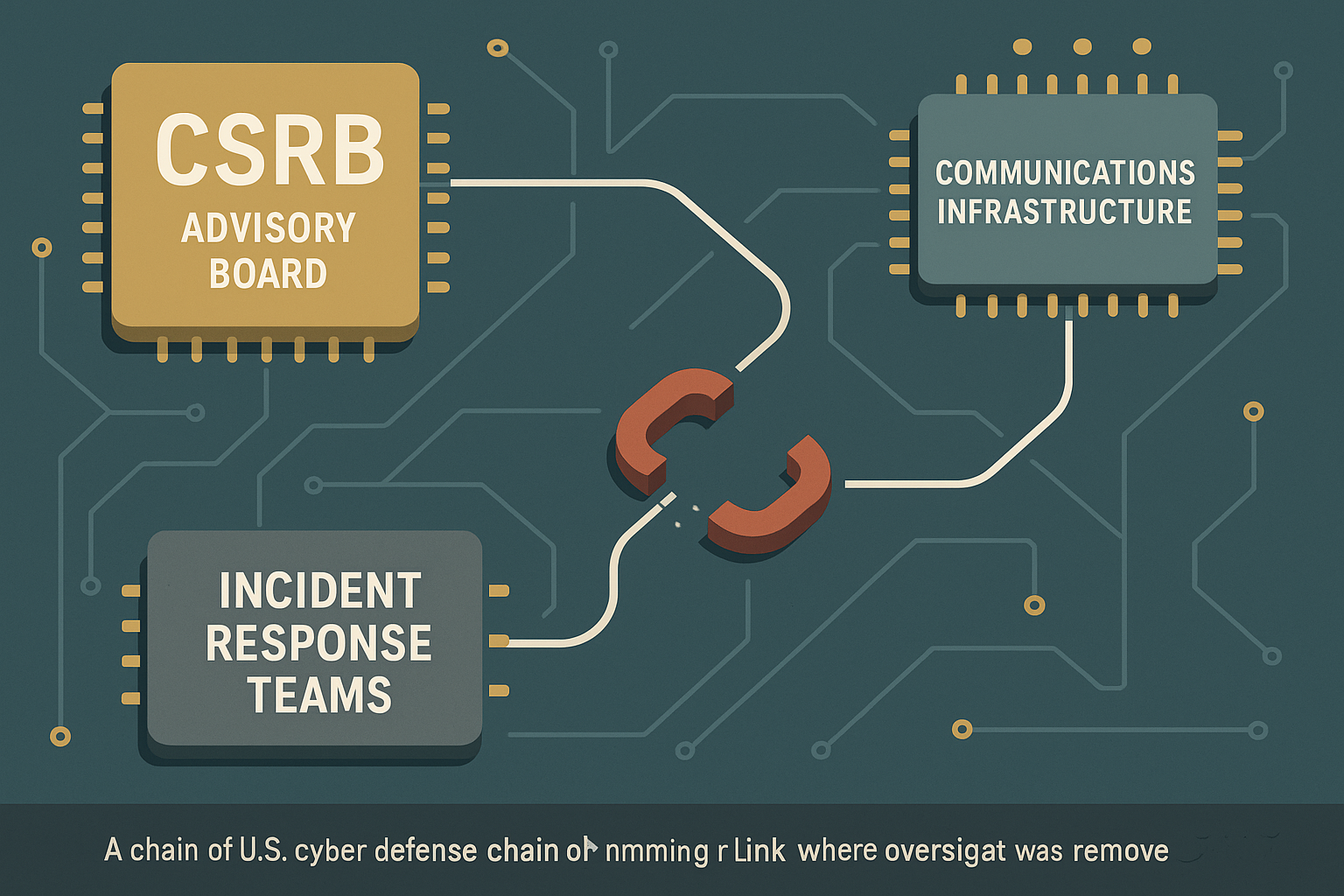CSRB Disbanded Amid Salt Typhoon: Cybersecurity at Risk?
The Watchdogs Have Left the Building
America’s cyber defenses just lost a critical link in their chain. This week, Congressional uproar erupted after the Department of Homeland Security abruptly dissolved the Cyber Safety Review Board (CSRB), even as evidence of a sweeping China-linked cyber campaign—Salt Typhoon—continues to mount.
It’s the sort of plot twist that requires more than a strong cup of coffee: the very committee tasked with untangling history’s largest U.S. telecom breach has vanished. Now, as nation-state hackers run amok, the public is left to wonder—who, exactly, is minding the store?

The Collapse of Cyber Oversight
The CSRB was no ordinary bureaucratic panel. Born out of necessity, it stood at the crossroads of national security and digital defense, dissecting major incidents and correcting systemic faults. Its most recent task was the investigation into Salt Typhoon—a sprawling breach that put U.S. and global telecom infrastructure in the crosshairs of Chinese state-aligned actors.
Salt Typhoon: More Than Just Another Hack
Salt Typhoon wasn’t your garden-variety phishing scam or ransomware attack. According to investigators, threat actors secured access deep within the veins of global communications, affording them unprecedented surveillance and manipulation capability. This is cyber warfare, not cyber mischief.
Yet, on January 20, 2025, the acting DHS Secretary under the previous administration disbanded the CSRB, framing it as a “resource realignment.” Critics call it an act of bureaucratic amnesia—a move that leaves a gaping blind spot in America’s digital defenses at the exact moment those defenses are needed most.
Congressional Alarm Bells and Missing Lessons
Democratic Senators have called for the CSRB’s reinstatement with urgency bordering on desperation. Four months without expert oversight is not just awkward timing; it’s an invitation for adversaries to exploit every procedural gap. The ghosts of past failures, such as the bungled 2023 Microsoft incident, loom large. Lessons on authentication and public transparency remain unheeded, even as the stakes rise exponentially.
The Absurdity of Timing
The irony is bitter: as intrusion sophistication surges, the advisory board intended to coordinate responses is shelved. Cybersecurity is hardly a zero-sum game—eliminating oversight bodies doesn’t un-complicate the threat landscape. DHS’s move signals the wrong message: chaos in homeland security isn’t just about software bugs, but about institutional disarray ripe for exploitation.
The Telecom Breach: A Digital Power Outage
Telecommunications infrastructure is society’s digital nervous system. When it’s breached, the damage isn’t hypothetical. Picture the digital equivalent of a hostile force commandeering city power grids and emergency controls—with the option to eavesdrop for good measure. Salt Typhoon blurred the boundaries of espionage and outright attack, pressing home the danger of leaving critical oversight roles vacant.
The Evolving Threat—and The Takedown That Should Have Been Celebrated
As cyber adversaries innovate, law enforcement tries to keep pace. The takedown of AvCheck.net—a central counter-antivirus tool for criminals—should have been a coordination victory for the CSRB to analyze and scale. Instead, the lack of strategic oversight means victories risk being isolated, fleeting, or strategically under-leveraged.
The Peril of Strategic Blindness
When cybercriminal supply chains are disrupted, someone has to “connect the dots”—and currently, no one’s holding the marker. Without expert review, national defense cannot outpace adversaries deploying scalable, innovative attacks.
Conclusion: Kafkaesque Irony or Cautionary Tale?
The paradox is clear: the more urgent the threat, the more precarious the loss of oversight. Is Washington treating cyber defense as an elective—hoping adversaries will eventually get bored—or will the alarms finally prompt a strategic rethink?
As Salt Typhoon continues to swirl, Congress may yet revive the CSRB. Until then, cyber adversaries seem to be relishing the U.S.’s governance dead zones. The real threat, it turns out, isn’t just hackers—it’s delay, distraction, and disbandment at precisely the wrong moment.



